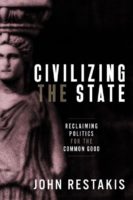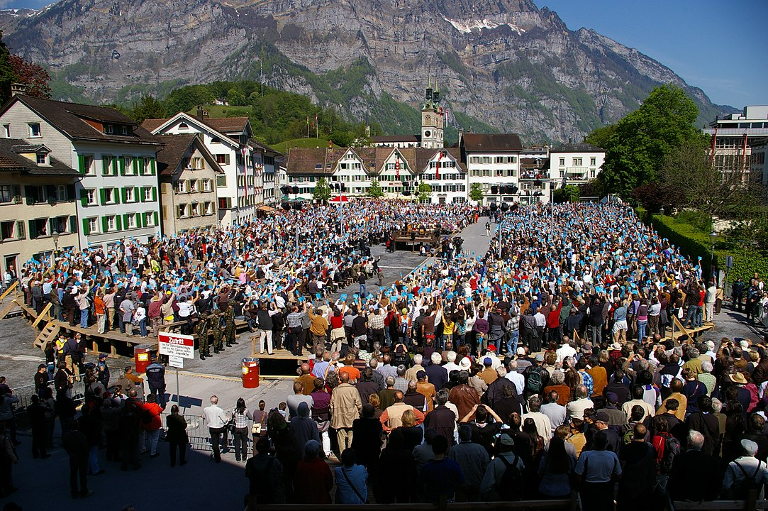 Ed. note: This piece is excerpted from Civilising the State by John Restakis and published by New Society Publishers, and is published here with permission.
Ed. note: This piece is excerpted from Civilising the State by John Restakis and published by New Society Publishers, and is published here with permission.
For very many of us, the worry and unease we feel are reinforced daily by the echo chambers we inhabit online and from whence we receive our increasingly controlled sense of the world around us.
We can feel the anxiety building on the streets of the world, on the lighted screens of our laptops, and in our bones. But what we are exposed to is a distorted and truncated view of things. Too often, we are left in the dark about those stories that reflect an altogether different picture of the world and of the people who are forging pathways for change that are both hopeful and indispensable if we are to navigate the uncertain terrain ahead. For this journey, we need an entirely different vision of what the future may hold and the pathways that may lead us there.
The threats posed by the politics of the status quo and its defenders are now not merely a question of political ideology or even of class. They have morphed into an existential threat to the survival of any form of humane civilization at all. The appearance of the corona virus is like a call for an awakening.
I believe that the scope of the change that is needed is profound. A transformative vision that is equal to the challenges we now face as a species is not merely an accumulation of incremental steps within the current setup. It is to understand and relate to the world in an entirely different way and to fashion a political order that reclaims and elevates those attributes in us that have always been the foundation of humane societies. Co-operation and the instinctive bonds that unite us with each other and with the natural world are central to this vision. The task of politics now is to make such a vision manifest.
My aim in this book is to expand on some key themes I introduced in Humanizing the Economy: Co-operatives in the Age of Capital. In that work, I attempted to show how a set of values based on democracy, co-operation, social justice, and the pursuit of the common good could, and are, being realized daily in the practice of co-operative economics the world over. In the work that follows, my aim is to show the implications of these values for the broader questions of political economy that are essential if we wish to alter the suicide course we are on.
My underlying hypothesis is that a deepening of democracy and co-operation for the common good are the only means by which the changes we seek might be realized. Contrary to the individualism and self-interest that sustain the capitalist worldview, the common good proposes an alternative framework for our political aims and a pathway through the crisis of legitimacy that imperils democracy itself. Both these tendencies — co-operation for common benefit and competition for self-interest — are embedded in every human society. How the human species handles these contending forces will determine the future that lies in store — for people and planet alike. But the values I treat here also deal with issues of spiritual renewal. I hope to show that co-operation and the common good are both the manifestation and the means by which a transformative vision of human community — and human consciousness — is made real.
The civilizing values that are the foundation of humane societies are present in every community. They have been with us always. The forms they take are prismatic. Like a light source refracted through the prism of time and place and culture, their manifestations in the world of politics are as various as the circumstances in which they are applied. Their realization is a continuous — and collective — labor of social and spiritual evolution.
The roles of the state and of civil society are at the center of this story. If the state has abandoned its duty as steward of the common welfare, if it has betrayed the only purpose that gives it legitimacy, it has not done so accidentally. And if the average citizen is left confused and uncertain of his or her place in the larger scheme of their community or country, it is the price we pay for the catastrophic erosion of the social values and basic trust that binds communities together. This, too, is a vacuum that is exploited by the demagogues of nationalism, of ethnicity and tribal identity whose politics serve not to heal and unite but to sow hatred and division.
We seek something better. And, contrary to the fatalist’s view that there is nothing to be done, that all politics is the same, that one government is as bad as the next, we will point to those examples that show how a different kind of politics and a different view of the future is possible. It is a hope that burns in the breasts of the millions that have been marching for change the world over. And, as the world confronts the consequences of a deadly pandemic, the deep reservoir of co-operation and concern for the common welfare that sustains all societies will be the key to weathering this crisis, as with every previous crisis.
Ultimately, this book is a work of hope and perhaps a torch in darkening times. I do not hide my sense that what I share here is also a work of experimentation — an extended reflection on what a very particular set of beliefs and values discloses when we begin to take them seriously as a foundation for a new political order. Nor do I hide my own ambivalence about whether such a vision as I present here is at all likely to be realized in the near future, or at all. But that isn’t the point.
Those who dreamt and fought for the ideals of democracy, liberty, and equality in the time of monarchs were indispensable precisely because their hopes seemed so distant to the times. They were torchbearers. They called upon values in the human condition that are innate in all people and all societies. These same values are vibrant and alive today, and it is precisely their violation that I believe is fuelling much of the rage and resentment we now witness. The task before us is to take up these same values and to invest them with the power and the means to remake the world in their image. What is this image?
That is the purpose of this book.
Teaser photo credit: A Landsgemeinde (in 2009) of the canton of Glarus, an example of direct democracy in Switzerland. By Marc Schlumpf, www.icarus-design.ch – http://www.fotocommunity.de/pc/pc/extra/mydiscuss/display/16944106, CC BY-SA 3.0, https://commons.wikimedia.org/w/index.php?curid=6708371





